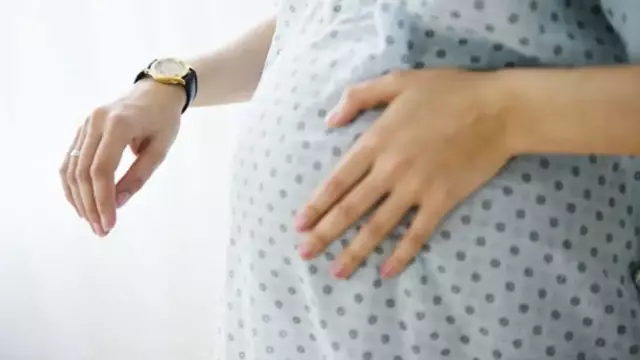- Author Rachel Wainwright [email protected].
- Public 2023-12-15 07:39.
- Last modified 2025-11-02 20:14.
Corpus luteum cyst

During ovulation, the ovarian follicle ruptures and the egg is released. At the site of the bursting follicle, a temporary endocrine gland is formed - the corpus luteum, which secretes progesterone. In the event that pregnancy does not occur, then the corpus luteum gradually begins to decrease in size and by 11 - 12 days after ovulation it completely disappears, and in its place a scar is formed - the white body of the ovary. During pregnancy, the corpus luteum functions up to 12 - 15 weeks, then the placenta takes over its functions, and it is scarred.
If the corpus luteum for some reason does not decrease in size and begins to fill with fluid (sometimes with blood content), then they speak of the formation of a corpus luteum cyst. This pathology is quite rare. According to statistics, this disease occurs in 2 - 5% of women of reproductive age.
The corpus luteum does not exceed 30 mm in diameter. If it becomes larger, then this is already a sign of cyst formation. Most often, corpus luteum cysts with a diameter of 60 to 80 mm are observed.
Corpus luteum cyst: causes
Currently, the exact causes of corpus luteum cysts are unknown. It is believed that various disorders of lymph circulation and blood circulation in the tissues of the corpus luteum lead to their formation.
Corpus luteum cysts can also be caused by:
- Long-term use of hormonal drugs;
- Heavy mental and physical stress;
- Work in hazardous production;
- Inflammatory diseases of the female genital organs;
- Poor nutrition, for example, long-term and frequent mono-diets.
All these factors cause various hormonal disturbances in a woman's body and, as a consequence, can cause the formation of a corpus luteum cyst.
Often a corpus luteum cyst is formed in pregnant women. It does not adversely affect pregnancy and fetal development.
Corpus luteum cyst: symptoms
By its appearance, a corpus luteum cyst is a small benign hollow formation containing fluid. With small cysts of the corpus luteum, symptoms of the disease are usually absent, and they are discovered by accident during ultrasound examination of the pelvic organs. These cysts usually go away on their own within a few menstrual cycles. The liquid contained in them dissolves, and the walls gradually fall off with the formation of a scar.
A large-diameter corpus luteum cyst can stretch the ovarian capsule and put pressure on its tissues. In this case, the patients complain that they have a corpus luteum cyst hurting. These pains are usually pulling and aching in nature, are localized in one lower abdomen and often radiate (give) to the lumbar region.
Symptoms of a corpus luteum cyst, such as various irregularities in the menstrual cycle (bleeding in the intermenstrual period, delayed menstruation) occur when the formation produces hormones.
Complications of corpus luteum cysts
The danger of a corpus luteum cyst is that it can be complicated by torsion of the leg or rupture of its capsule.

When a cyst ruptures, a woman begins to complain that her corpus luteum cyst is very sore. Then there is nausea, dizziness, severe weakness. This complication requires urgent surgical care. During the operation, a section of the ovary is resected or the cyst bed is sutured.
When the legs of the corpus luteum cyst are twisted, blood flow is disturbed in it. As a result, the cyst tissue begins to die (necrosis) and inflammation occurs, which very quickly spreads to neighboring organs, including the peritoneum, causing the development of such a dangerous disease as peritonitis. With this complication, the woman also needs emergency surgery. Therefore, if you have a corpus luteum cyst, then do not waste precious time on self-diagnosis, but urgently contact a gynecologist!
Corpus luteum cyst: treatment
Small cysts of the corpus luteum with a diameter of up to 40 mm usually do not require any treatment and resolve on their own within a few menstrual cycles. Conservative treatment of corpus luteum cysts is prescribed in cases when the patient complains that she has a corpus luteum cyst hurts or there are menstrual dysfunctions. Also, conservative treatment is prescribed to patients with recurrent corpus luteum cysts and in cases where their diameter exceeds 40 mm.
The goals of conservative treatment of corpus luteum cysts are:
- Compensation of microelement and vitamin deficiencies;
- Normalization of metabolic processes, as well as the functions of the kidneys, gastrointestinal tract, liver;
- Restoration of normal hormonal balance;
- Treatment of chronic gynecological diseases.
During the treatment of the corpus luteum cyst, sexual activity is not prohibited. However, intercourse should be careful and gentle so as not to rupture the cyst or twist its legs. But it is not advisable to perform physical exercises associated with sudden changes in body position or straining.
Surgical treatment of corpus luteum cysts is performed only if conservative therapy is ineffective or if complications of the disease develop.
YouTube video related to the article:
The information is generalized and provided for informational purposes only. At the first sign of illness, see your doctor. Self-medication is hazardous to health!






